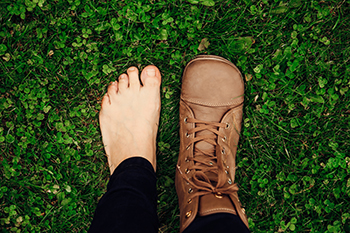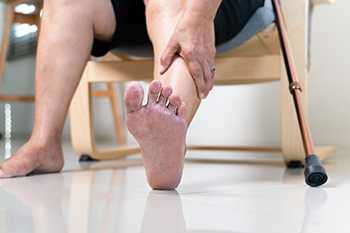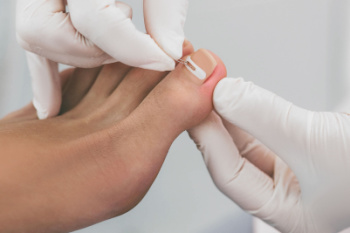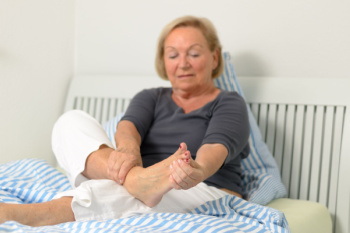BLOG

When it comes to gardening, ensuring proper foot protection is essential to prevent injuries and maintain comfort throughout the day. To minimize the risk of injury, it is helpful for gardeners to invest in sturdy, closed-toe footwear with slip-resistant soles that provide traction on various surfaces. Additionally, garden boots or shoes with reinforced toes and puncture-resistant soles can offer extra protection from hazards that may be found in the garden, such as thorny areas. Wearing properly fitting footwear is vital to prevent blisters, chafing, and discomfort during long hours of working in the garden. In hot weather, breathable materials can help keep the feet cool and dry, while waterproof footwear is essential for working in wet or muddy conditions. If you have incurred a foot injury while working outdoors, it is suggested that you consult a podiatrist.
While working on the feet, it is important to take the proper care of them. For more information about working on your feet, contact one of our podiatrists from Livingston Foot Care Specialists. Our doctors will treat your foot and ankle needs.
Working on Your Feet
Standing on your feet for long periods of time can cause stress and pain in your feet. Your whole body may experience change in terms of posture, back pain, bunions, callouses and or plantar warts. There are ways to avoid these conditions with proper foot care, smart choices and correct posture.
Positive Changes
Negative heeled shoe – Choosing this shoe type places the heel slightly lower than the ball of the foot. These are great for overall foot health. Find shoes that fit you correctly.
Go barefoot – Our feet were not designed to be enclosed for all hours of the day. Try to periodically expose your feet to air.
Eliminate Pain
Foot Exercises – Performing simple exercises, incorporating yoga and doing stretches are beneficial. This will allow increased blood flow to the area and muscles of the foot.
Achilles tendon – Stretching the foot out flat on the floor will relax the calf muscles and tendon. These exercises can be performed almost anywhere. Make sure you add these exercises to your daily regimen.
With a little bit of this information and knowing more about foot health, you will notice changes. Foot stretches and proper footwear will help with pain and prevent further issues.
If you have any questions please feel free to contact our office located in North Bellmore, NY . We offer the newest diagnostic and treatment technologies for all your foot and ankle needs.

As you age, your feet require extra attention and care to maintain mobility and overall well-being. Proper foot care is essential for seniors to prevent common issues such as foot pain, infections, and injuries. Regular inspection of the feet is vital, and this includes checking for cuts, sores, or signs of infection, especially for those with diabetes or circulatory issues. Keeping the feet clean and dry, including thorough drying between the toes, helps prevent fungal infections like athlete's foot. Seniors should wear comfortable, properly fitting shoes with adequate support and cushioning to reduce pressure and friction on the feet. Regular foot exercises and stretches can improve circulation, flexibility, and strength, enhancing balance and reducing the risk of falls. Additionally, maintaining a healthy lifestyle with proper nutrition and hydration supports overall foot health. If you are a senior experiencing foot pain, it is strongly suggested that routine appointments are scheduled with a podiatrist who can provide you with relief options.
Proper foot care is something many older adults forget to consider. If you have any concerns about your feet and ankles, contact one of our podiatrists from Livingston Foot Care Specialists. Our doctors can provide the care you need to keep you pain-free and on your feet.
The Elderly and Their Feet
As we age we start to notice many changes in our body, but the elder population may not notice them right away. Medical conditions may prevent the elderly to take notice of their foot health right away. Poor vision is a lead contributor to not taking action for the elderly.
Common Conditions
- Neuropathy – can reduce feeling in the feet and can hide many life-threatening medical conditions.
- Reduced flexibility – prevents the ability of proper toenail trimming, and foot cleaning. If left untreated, it may lead to further medical issues.
- Foot sores – amongst the older population can be serious before they are discovered. Some of the problematic conditions they may face are:
- Gouging toenails affecting nearby toe
- Shoes that don’t fit properly
- Pressure sores
- Loss of circulation in legs & feet
- Edema & swelling of feet and ankles
Susceptible Infections
Diabetes and poor circulation can cause general loss of sensitivity over the years, turning a simple cut into a serious issue.
If you have any questions please feel free to contact our office located in North Bellmore, NY . We offer the newest diagnostic and treatment technologies for all your foot and ankle needs.

Ingrown toenails can be a literal pain, causing discomfort and sometimes infection. Fortunately, there are surgical solutions such as nail avulsion and wedge excision. Nail avulsion involves removing the entire nail or part of it, providing relief by preventing further ingrowth. This procedure is commonly used when the ingrown nail is recurring or severe. Conversely, wedge excision involves removing a portion of the nail along with the underlying tissue. It aims to eliminate the ingrown part while preserving the appearance and function of the nail. Both procedures are typically performed under local anesthesia, ensuring minimal discomfort for the patient. Following either procedure, proper post-operative care is vital in promoting healing and preventing complications. Ultimately, nail avulsion and wedge excision offer effective solutions for those suffering from the discomfort of ingrown toenails, providing relief and restoring comfort to daily activities. If you have an ingrown toenail, it is suggested that you speak to a podiatrist who can help you decide if one of these types of foot surgery is right for you.
Foot surgery is sometimes necessary to treat a foot ailment. To learn more, contact one of our podiatrists of Livingston Foot Care Specialists. Our doctors will assist you with all of your foot and ankle needs.
When Is Surgery Necessary?
Foot and ankle surgery is generally reserved for cases in which less invasive, conservative procedures have failed to alleviate the problem. Some of the cases in which surgery may be necessary include:
- Removing foot deformities like bunions and bone spurs
- Severe arthritis that has caused bone issues
- Cosmetic reconstruction
What Types of Surgery Are There?
The type of surgery you receive will depend on the nature of the problem you have. Some of the possible surgeries include:
- Bunionectomy for painful bunions
- Surgical fusion for realignment of bones
- Neuropathy decompression surgery to treat nerve damage
Benefits of Surgery
Although surgery is usually a last resort, it can provide more complete pain relief compared to non-surgical methods and may allow you to finally resume full activity.
Surgical techniques have also become increasingly sophisticated. Techniques like endoscopic surgery allow for smaller incisions and faster recovery times.
If you have any questions please feel free to contact our office located in North Bellmore, NY . We offer the newest diagnostic and treatment technologies for all your foot and ankle needs.

Gout, often associated with men, can also affect women, although less frequently. Characterized by sudden and intense joint pain, particularly in the big toe, gout occurs due to uric acid buildup in the bloodstream, leading to crystal formation in the joints. While men tend to develop gout at an earlier age, women become more susceptible after menopause due to hormonal changes. Managing gout in women involves lifestyle modifications such as maintaining a healthy weight, avoiding purine-rich foods like red meat and alcohol, and staying hydrated. Medications like colchicine and urate-lowering therapies may help to alleviate symptoms and prevent future attacks. Additionally, women with gout should prioritize regular exercise and follow-up appointments with their podiatrist to monitor uric acid levels and adjust treatment as needed. If gout has affected your life, it is strongly suggested that you are under the care of a podiatrist who can help you manage this painful condition.
Gout is a painful condition that can be treated. If you are seeking treatment, contact one of our podiatrists from Livingston Foot Care Specialists. Our doctors will treat your foot and ankle needs.
What Is Gout?
Gout is a form of arthritis that is characterized by sudden, severe attacks of pain, redness, and tenderness in the joints. The condition usually affects the joint at the base of the big toe. A gout attack can occur at any random time, such as the middle of the night while you are asleep.
Symptoms
- Intense Joint Pain - Usually around the large joint of your big toe, and it most severe within the first four to twelve hours
- Lingering Discomfort - Joint discomfort may last from a few days to a few weeks
- Inflammation and Redness -Affected joints may become swollen, tender, warm and red
- Limited Range of Motion - May experience a decrease in joint mobility
Risk Factors
- Genetics - If family members have gout, you’re more likely to have it
- Medications - Diuretic medications can raise uric acid levels
- Gender/Age - Gout is more common in men until the age of 60. It is believed that estrogen protects women until that point
- Diet - Eating red meat and shellfish increases your risk
- Alcohol - Having more than two alcoholic drinks per day increases your risk
- Obesity - Obese people are at a higher risk for gout
Prior to visiting your podiatrist to receive treatment for gout, there are a few things you should do beforehand. If you have gout you should write down your symptoms--including when they started and how often you experience them, important medical information you may have, and any questions you may have. Writing down these three things will help your podiatrist in assessing your specific situation so that he or she may provide the best route of treatment for you.
If you have any questions, please feel free to contact our office located in North Bellmore, NY . We offer the newest diagnostic and treatment technologies for all your foot care needs.